Training and capacity building Publications
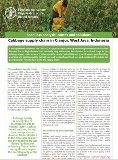
Food loss analysis causes and solutions: Cabbage supply chain in Cianjur, West Java, Indonesia. Fact Sheet
30/09/2023
Cabbage (Brassica oleracea var. capitata) is a popular vegetable to grow among Indonesian smallholder farmers due to high demand and relatively easy cultivation. Post-harvest is a critical stage in the cabbage supply chain because it determines the product saleability and price. However, poor handling practices and careless quality control can lead to significant food loss and consequently reduce the profit margins for all actors along the supply chain.
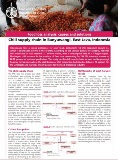
Food loss analysis causes and solutions: Chili supply chain in Banyuwangi, East Java, Indonesia. Fact Sheet.
30/09/2023
Indonesians have a strong preference for spicy food, particularly red chili (Capsicum annum L.), which is abundantly grown in the country. According to the Central Bureau of Statistics, national chili production in 2020 reached 2.77 million tonnes, with a consumption rate of 2.14 kg per capita. The largest chili producer is the province of East Java, accounting for 784 050 thousand tonnes or 28.28 percent of national production.

Guidelines for action on food loss and waste reduction in the Near East and North Africa
31/08/2023
The Guidelines for action on food loss and waste reduction in the Near East and North Africa provide support to Member Countries to implement the Voluntary Code of Conduct for Food Loss and Waste Reduction, an international instrument designed to guide FLW policymaking and interventions at global level.

Developing Capacity to Reduce Food Loss and Waste in Thailand
01/03/2023
Reducing FLW is not, however, a high priority for many micro, small and medium enterprises (MSMEs) in developing countries. MSMEs often do not quantify the food that is lost in their processing and distribution operations, or wasted in retail, and their real impacts on profitability and the environment.

Reducing food loss and waste in the Near East and North Africa
28/02/2023
This study looks at FLW from an economic perspective, considering producers, intermediaries, and consumers as key decision-makers. It builds on our accumulated experience in the analysis of the causes of FLW and solutions.
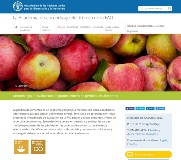
Food loss analysis case study methodology | E-learning course
30/10/2022
Food loss is a complex issue, often with multiple and interrelated causes operating at different levels. This e-learning course introduces the FAO Case study methodology for the analysis of critical food loss points. This method focuses on revealing and analyzing the multidimensional causes of losses in selected food supply chains, identification of critical loss points, and recommendation of feasible food loss reduction solutions and strategies.

Food waste management and circular economy in Mediterranean cities
26/10/2022
Stakeholders from across the Mediterranean shared practical experiences of their engagement in circular economy practices for food waste management at urban/local level. Tackling food waste and circularity from diverse angles of the Mediterranean food systems, they reflected on success factors and challenges, discussing ways to facilitate partnerships and replication of solutions across the Mediterranean.
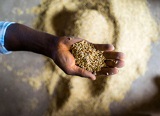
A holistic approach to food loss reduction in Africa: food loss analysis, integrated capacity development and policy implications
10/06/2022
This paper highlights the critical need for a paradigm shift of current research and development programs aimed at food loss reduction, as demonstrated by findings of a project implemented in Burkina Faso, the Democratic Republic of Congo and Uganda by the United Nations Rome-based Agencies (RBAs) – The Food and...

Highlights of the project "Mainstreaming food loss reduction initiatives for smallholders in food deficit areas"
01/01/2021
This brochure highlights the achievements and results of a project jointly developed and implemented by the three United Nations (UN) Rome-based agencies (RBA) FAO, IFAD, and WFP from 2013 to 2020, funded by the Swiss Development and Cooperation Agency, that contributes towards the AU Malabo declaration and SDG targets for...

Food loss analyses to identify critical loss points, main causes of losses and to recommend solutions to reduce post-harvest losses
01/01/2021
The UN Rome-based agencies joint project aimed to improve smallholder food security and incomes in food deficit areas by reducing food losses. The Project contributes to the African Union Malabo Declaration (AUC, 2014) in which Member States committed to halve the levels of post-harvest losses by 2025.

Estimating fish and post-harvest loss measurement in Guyana
20/12/2020
This report presents details about the training workshop and experience gained from testing of the Guidelines on fish loss measurement. It includes situation analysis, training needs assessment (TNA), selection of participants, goal and objectives, training description, preparation of training, delivery of training, and evaluation.

Post-harvest management of papaya to ensure quality and safety
30/11/2020
Guidance for stakeholders in the horticultural supply chain. Good post-harvest handling is important in maintaining the quality and safety of papayas as they are transported from the farm to the market.

Post-harvest management of papaya to ensure quality and safety
29/11/2020
Guidance for stakeholders in the horticultural supply chain. Good post-harvest handling is important in maintaining the quality and safety of papayas as they are transported from the farm to the market.
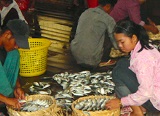
E-learning: Food Loss and waste in fish value chains
01/06/2020
Food Loss and Waste (FLW) in the fisheries sector is a complex issue with multiple and interrelated causes at different levels. Policy makers, the public and private sectors require solutions not only to be economically beneficial, but also to generate or sustain benefits for society.

Post-harvest management of lettuce to ensure quality and safety
30/04/2020
Guidance for stakeholders in the horticultural supply chain. Good post-harvest handling is important in maintaining the quality and safety of lettuce as they are transported from the farm to the market.
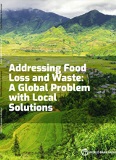
Addressing Food Loss and Waste : A Global Problem with Local Solutions
31/01/2020
The report focuses on the role that food loss and waste (FLW) could play in reducing the environmental footprint of food systems while attempting to meet the caloric and nutrient needs of a population expected to increase by 3 billion people in the next 30 years.
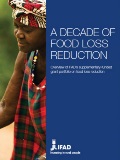
A decade of food loss reduction
01/01/2020
An overview of IFAD’s supplementary-funded grant portfolio on food loss reduction. According to recent estimates, 14 per cent of the world’s food production is lost before it reaches the consumer. Food losses disproportionately affect developing countries, threatening people’s livelihoods, especially those dependent on agriculture.
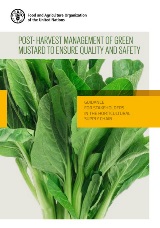
Post-harvest management of green mustard to ensure quality and safety
01/01/2020
This brochure was developed to display the results of the FAO Technical Cooperation Project: TCP/TIM/3310, Capacity-development to reduce post-harvest losses in horticultural chains in Greater Mekong Subregion (GMS) countries. Improvement in the implementation of good practice in post-harvest handling to assure safety were piloted. This brochure aims to provide information on...
-methodology-a-guide-for-researchers-and-practitioners.tmb-th600x450.jpg?Culture=en&sfvrsn=9f7df185_1)
The NUTRI-P-LOSS (NUTRItional Postharvest Loss) methodology: a guide for researchers and practitioners
01/01/2019
Postharvest losses and food security are important concerns in low- and middle-income countries (LMICs) and research in these areas has become a global priority. Measuring nutritional losses along the crop value chain (VC) can deepen quantitative and qualitative understanding of these losses.

Gender and food loss in sustainable food value chains. A guiding note
01/07/2018
This publication aims to help policy-makers, project designers and field practitioners to conceptualize the nexus between gender equality and food loss while offering practical guidance on and tools for integrating gender concerns into the planning and implementation of food loss studies and reduction strategies and interventions.
